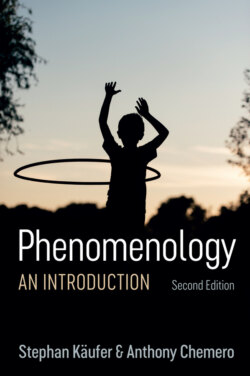Читать книгу Phenomenology - Anthony Chemero - Страница 21
2.2 William James and functionalism
ОглавлениеAt the same time that Wundt developed his scientific psychology, William James was teaching a very different version of the science, one whose primary influence was Darwin. For Wundt, scientific psychology was the use of the methods of psychophysics to study simple sensations. As he wrote in his 1890 textbook The Principles of Psychology, James doubted that there even were simple sensations, and thought that Wundt’s focus on them was harmful to the science.
Most books start with sensations, as the simplest mental facts, and proceed synthetically, constructing each higher stage from those below it. But this is abandoning the empirical method of investigation. No one ever had a simple sensation by itself. Consciousness, from our natal day, is of a teeming multiplicity of objects and relations, and what we call simple sensations are results of discriminative attention, pushed often to a very high degree. It is astonishing what havoc is wrought in psychology by admitting at the outset apparently innocent suppositions, that nevertheless contain a flaw. The bad consequences develop themselves later on, and are irremediable, being woven through the whole texture of the work. The notion that sensations, being the simplest things, are the first things to take up in psychology is one of these suppositions. (1890, p. 225)
Focusing exclusively on simple sensations, James argued, missed most of what a science of the mind should be about:
Psychology is the Science of Mental Life, both of its phenomena and of their conditions. The phenomena are such things as we call feelings, desires, cognitions, reasonings, decisions, and the like; and, superficially considered, their variety and complexity is such as to leave a chaotic impression on the observer. (1890, p. 1)
The science imagined by James was thus much broader in scope than the studies of sensations being undertaken at Wundt’s institute in Leipzig. Although not mentioned in this quotation, habits, emotions, consciousness, instinct, perception, imagination, and memory receive explicit attention in the text, along with the mental lives of infants and non-human animals. Of course, James thought we should study sensations – he devotes a chapter to them – but not as the sole or foundational subject matter as Wundt did.
Because James was explicitly Darwinist in approach, he argued for understanding each of these aspects of the mind as an adaptation to the environment. Just as your lungs are a lifelong adaptation to our oxygen-rich atmosphere, your belief that you are holding a book is a temporary adaptation to your current situation. Aspects of our mental life, in other words, were to be understood in terms of what they are for. Because of this, Titchener (1898a) mockingly called the Jamesian approach “functionalism,” a name that stuck. Understanding the mind as a collection of adaptations makes the contrast with Wundtian psychology even starker. Particular adaptations must be understood in the context of the environment, and in the context of the whole animal. Lungs have their functions only in oxygen-rich environments, and only when paired with hearts and circulatory systems. Moreover, adaptations can only be understood historically, over developmental and evolutionary time. Understanding how lungs came to have the functions that they do requires understanding how our lungs develop and how they functioned in our evolutionary ancestors. While Wundt and his followers focused narrowly on instantaneous simple sensations, functionalist psychologists studied aspects of the mind in the context of the environment, over developmental and evolutionary timescales.
James published his textbook at the time when psychology began to become a discipline separate from philosophy. He stayed with philosophy, and his own work became increasingly philosophical. He called his later philosophical views “radical empiricism.” He characterizes radical empiricism as consisting “first of a postulate, next of a fact, and finally of a generalized conclusion” (1909 p. xii). His postulate is that all and only things that are experienced exist. His fact is that relations are experienced. It follows, of course, that relations exist. His generalized conclusion is that the world is experienced directly. This last point is an explicit rejection of the Kantian distinction between the empirical world that we experience and the world-in-itself. James is claiming that there is only the world of what he calls “pure experience.” His view amounts to a sort of neutral monism – there is only one world, and it is neither material nor mental. The world experienced and the experiences themselves are the very same thing:
As “subjective” we say that the experience represents; as “objective” it is represented. What represents and what is represented is here numerically the same; but we must remember that no dualism of being represented and representing resides in the experience per se. In its pure state, or when isolated, there is no self-splitting of it into consciousness and what the consciousness is “of.” Its subjectivity and objectivity are functional attributes solely, realized only when the experience is “taken,” i.e., talked-of, twice, considered along with its two differing contexts respectively, by a new retrospective experience, of which that whole past complication now forms the fresh content. The instant field of the present is at all times what I call the “pure” experience. It is only virtually or potentially either object or subject as yet. For the time being, it is plain, unqualified actuality, or existence, a simple that. (1904, p. 484)
This passage is from “Does consciousness exist?” (1904). James’ answer to the question is that it does not exist, if what you mean by consciousness is something inside your mind and representing the external world. This view becomes very influential on the work of James Gibson (Chapter 10).
